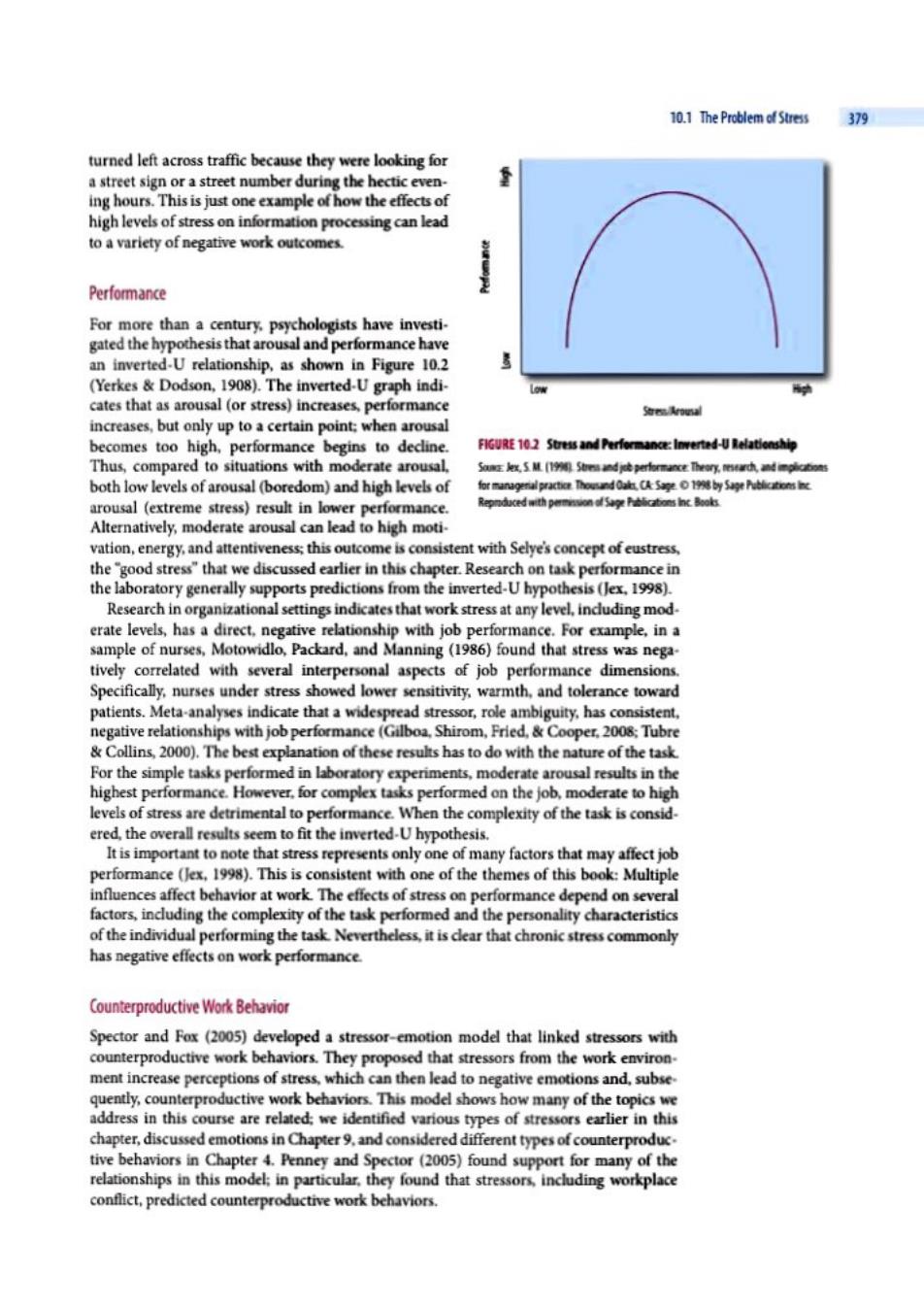正在加载图片...

10.1 The Problem of Stress 379 turned left across traffic because they were looking for a street sign or a street number during the hectic even- ing hours.This is just one example of how the effects of high levels of stress on information processing can lead to a variety of negative work outcomes. Performance For more than a century.psychologists have investi- gated the hypothesis that arousal and performance have an inverted-U relationship,as shown in Figure 10.2 (Yerkes Dodson,1908).The inverted-U graph indi- cates that as arousal (or stress)increases,performance 知Aaud increases,but only up to a certain point:when arousal becomes too high,performance begins to decline. FIGURE 10.2 Stress and Performance:Inverted-U Relationship Thus,compared to situations with moderate arousal. SauE线5 M.(1991 Stms and je performance年#流dek6s both low levels of arousal (boredom)and high levels of rnag学ractie Thowand0t使5家o1%yS学tmx arousal (extreme stress)result in lower performance. Repmduced with permission l Sape hcatons inc Boalks Alternatively,moderate arousal can lead to high moti- vation,energy,and attentiveness;this outcome is consistent with Selye's concept of eustress. the 'good stress"that we discussed earlier in this chapter.Research on task performance in the laboratory generally supports predictions from the inverted-U hypothesis (Jex.1998). Research in organizational settings indicates that work stress at any level,induding mod. erate levels,has a direct,negative relationship with job performance.For example,in a sample of nurses,Motowidlo,Packard,and Manning (1986)found that stress was nega- tively correlated with several interpersonal aspects of job performance dimensions. Specifically,nurses under stress showed lower sensitivity.warmth,and tolerance toward patients.Meta-analyses indicate that a widespread stressor,role ambiguity,has consistent. negative relationships with job performance(Gilboa.Shirom,Fried,Cooper,2008:Tubre Collins,2000).The best explanation of these results has to do with the nature of the task. For the simple tasks performed in laboratory experiments,moderate arousal results in the highest performance.However,for complex tasks performed on the job,moderate to high levels of stress are detrimental to performance.When the complexity of the task is consid. ered,the overall results seem to fit the inverted-U hypothesis. It is important to note that stress represents only one of many factors that may affect job performance (Jex,1998).This is consistent with one of the themes of this book:Multiple influences affect behavior at work.The effects of stress on performance depend on several factors,incuding the complexity of the task performed and the personality characteristics of the individual performing the task.Nevertheless,it is dear that chronic stress commonly has negative effects on work performance. Counterproductive Work Behavior Spector and Fox (2005)developed a stressor-emotion model that linked stressors with counterproductive work behaviors.They proposed that stressors from the work environ. ment increase perceptions of stress,which can then lead to negative emotions and,subse. quently,counterproductive work behaviors.This model shows how many of the topics we address in this course are related:we identified various types of stressors earlier in this chapter,discussed emotions in Chapter 9.and considered different types of counterproduc. tive behaviors in Chapter 4.Penney and Spector (2005)found support for many of the relationships in this model:in particular,they found that stressors,including workplace conflict,predicted counterproductive work behaviors